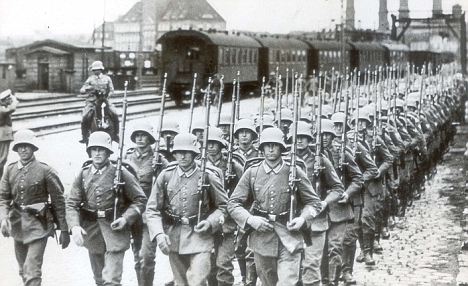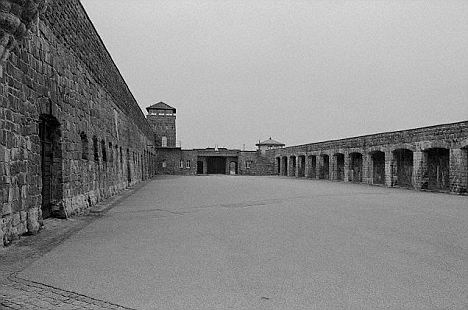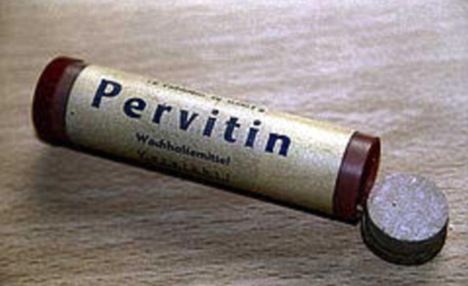Note from CCHR: The drug cited in this article, Pertivin, was Methamphetamine, what the Daily Mail is referring to as crystal meth. Methamphetamine is FDA approved for use in children under the trade name Desoxyn for the ‘treatment’ of ADHD. So today, children are basically being given the same ‘highly addictive’ crystal meth that the Nazi soldiers were given…
Daily Mail
Alan Hall
March 31, 2011
-
200 million pills were given to soldiers during the War
Hitler’s propaganda stressed the importance of keeping fit and abstaining from drink and tobacco to keep the Aryan race strong and pure.
But in reality his soldiers were taking addictive and damaging chemicals to make them fight longer and more fiercely.
A study of medicines used by the Third Reich exposes how Nazi doctors and officers issued recruits with pills to help them fight longer and without rest.
The German army’s drug of choice as it overran Poland, Holland, Belgium and France was Pervitin – pills made from methamphetamine, commonly known today as crystal meth.

Drugged up: German army records show millions of Pervitin amphetamines were doled out to Nazi troops in WWII
By the time the invasion of the Soviet Union was launched in 1941, hundreds of thousands of soldiers were doped up on it. Records of the Wehrmacht, the German army, show that some 200 million Pervitin pills were doled out to the troops between 1939 and 1945.
Research by the German Doctors’ Association also showed the Nazis developed a cocaine-based stimulant for its front-line fighters that was tested on concentration camp inmates.
‘It was Hitler’s last secret weapon to win a war he had already lost long ago,’ said criminologist Wolf Kemper, author of a German language book on the Third Reich’s use of drugs called Nazis On Speed.

Cruelty: Inmates at the Dachau camp were victims of horrific Nazi experiments aimed at helping troops' injuries

Experiments: Inmates at the Mauthausen concentration camp in Austria, where 100,000 people died, suffered chemical burns as Nazi doctors tested the impact of phosphorous shells
The drug, codenamed D-IX, was tested at the Sachsenhausen concentration camp north of Berlin, where prisoners loaded with 45lb packs were reported to have marched 70 miles without rest.
The plan was to give all soldiers in the crumbling Reich the wonder drug – but the invasion of Normandy in June 1944, coupled with crippling Allied bombing, scotched the scheme.
‘The Blitzkrieg was fuelled by speed,’ said a pharmacologist. ‘The idea was to turn ordinary soldiers, sailors and airmen into automatons capable of superhuman performance.’
Medical authorities say the downside of the plan was that many soldiers became helplessly addicted to drugs and were of no use in any theatre of war.
Otto Ranke, a military doctor and director of the Institute for General and Defence Physiology at Berlin’s Academy of Military Medicine, was behind the Pervitin scheme.
He found that the drug gave users heightened self-confidence and self-awareness.
On the eastern front, where the fighting was the most savage of the war, soldiers used it in massive quantities against an enemy that showed no mercy.
In January 1942, one group of 500 troops surrounded by the Red Army were attempting to escape in temperatures of minus 30 Degrees C.
‘I decided to give them Pervitin as they began to lie down in the snow wanting to die,’ wrote the medical officer for the unit.
‘After half an hour the men began spontaneously reporting that they felt better.
‘They began marching in orderly fashion again, their spirits improved, and they became more alert.’
Concentration camp prisoners were also the victims of terrible experiments overseen by German doctors aimed at making the war less risky for their own troops.
At Dachau hundreds died in vats of ice water as physicians sought to find a way to better insulate the flying suits of Luftwaffe pilots brought down in the sea.
And at Mauthausen in Austria inmates suffered horrific chemical burns as the doctors sought cures for phosphorous shell injuries.
Physician’s group president Jörg-Dietrich Hoppe said: ‘I will be the last president of this group who lived through this time.
‘It is intolerable to think that so many physicians were silent or complicit in what was done in the name of medicine at this time.’
Read article here: http://www.dailymail.co.uk/news/article-1371512/Nazis-fed-speed-infantrymen-tested-cocaine-like-stimulant-concentration-camps.html



SHARE YOUR STORY/COMMENT